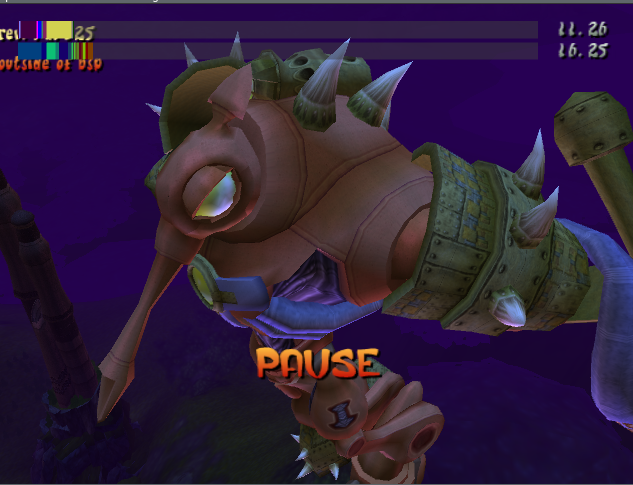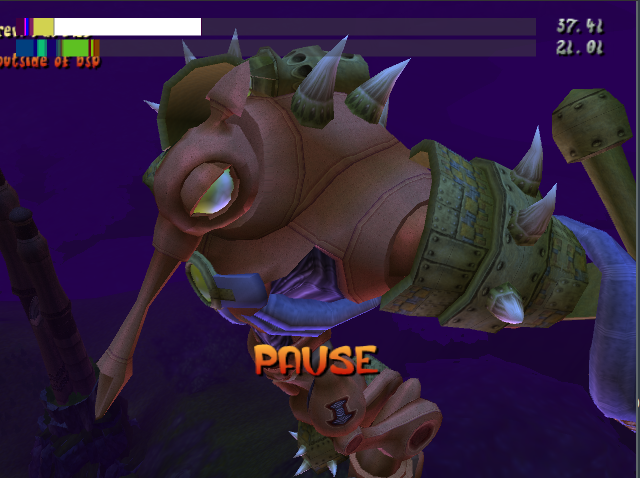mirror of
https://github.com/open-goal/jak-project.git
synced 2024-10-20 11:26:18 -04:00
This adds environment mapping support to `Merc2`, and turns it on for Jak 1 and Jak 2. - The performance is much better - Jak 1 can be toggled back to the old behavior with `(set! *emerc-hack* #f)`. The new environment mapping is identical to the old one everywhere I checked. - Jak 1 still falls back to generic for ripple/texscroll/blerc/eyes - there's still no dynamic texture or vertex updating support. The eye detection stuff will sometimes flag stuff as eyes which is not eyes, which is fine, but means that generic will be used in some places where emerc could be used. For example, the shiny plates on jak's arm will be drawn with generic because jak has eyes. - Jak 2 hasn't been checked super carefully against PCSX2 yet. - Jak 2 still isn't technically using emerc, but instead putting emerc models in the merc bucket. - The interface to merc is a lot different now and totally custom OpenGOAL DMA code. The original merc drawing asm doesn't run anymore. - The FR3 format changed - Something funky going on with foreground lighting in escape, but doesn't seem to be related to this change? Performance comparison, jak 1, in likely the most generic-merc heavy spot:  
175 lines
3.9 KiB
C++
175 lines
3.9 KiB
C++
#pragma once
|
|
|
|
/*!
|
|
* @file dma.h
|
|
* PS2 DMA and VIF types.
|
|
*/
|
|
|
|
#include <cstring>
|
|
#include <string>
|
|
|
|
#include "common/common_types.h"
|
|
#include "common/util/Assert.h"
|
|
|
|
#include "third-party/fmt/core.h"
|
|
|
|
struct DmaStats {
|
|
double sync_time_ms = 0;
|
|
int num_tags = 0;
|
|
int num_data_bytes = 0;
|
|
int num_chunks = 0;
|
|
int num_copied_bytes = 0;
|
|
int num_fixups = 0;
|
|
};
|
|
|
|
struct DmaTag {
|
|
enum class Kind : u8 {
|
|
REFE = 0,
|
|
CNT = 1,
|
|
NEXT = 2,
|
|
REF = 3,
|
|
REFS = 4,
|
|
CALL = 5,
|
|
RET = 6,
|
|
END = 7
|
|
};
|
|
|
|
DmaTag(u64 value) {
|
|
spr = (value >> 63);
|
|
addr = (value >> 32) & 0x7fffffff;
|
|
qwc = value & 0xfff;
|
|
kind = Kind((value >> 28) & 0b111);
|
|
}
|
|
|
|
u16 qwc = 0;
|
|
u32 addr = 0;
|
|
bool spr = false;
|
|
Kind kind;
|
|
|
|
bool operator==(const DmaTag& other) const {
|
|
return qwc == other.qwc && addr == other.addr && spr == other.spr && kind == other.kind;
|
|
}
|
|
|
|
bool operator!=(const DmaTag& other) const { return !((*this) == other); }
|
|
|
|
std::string print();
|
|
};
|
|
|
|
inline void emulate_dma(const void* source_base, void* dest_base, u32 tadr, u32 dadr) {
|
|
const u8* src = (const u8*)source_base;
|
|
u8* dst = (u8*)dest_base;
|
|
|
|
u32 dest_offset = dadr;
|
|
while (true) {
|
|
u64 tag_data;
|
|
memcpy(&tag_data, src + tadr, 8);
|
|
DmaTag tag(tag_data);
|
|
|
|
switch (tag.kind) {
|
|
case DmaTag::Kind::CNT:
|
|
memcpy(dst + dest_offset, src + tadr, (1 + tag.qwc) * 16);
|
|
dest_offset += (1 + tag.qwc) * 16;
|
|
tadr += 16 + tag.qwc * 16;
|
|
break;
|
|
case DmaTag::Kind::NEXT:
|
|
memcpy(dst + dest_offset, src + tadr, (1 + tag.qwc) * 16);
|
|
dest_offset += (1 + tag.qwc) * 16;
|
|
tadr = tag.addr;
|
|
break;
|
|
case DmaTag::Kind::REF: {
|
|
// tte
|
|
memcpy(dst + dest_offset, src + tadr, 16);
|
|
dest_offset += 16;
|
|
|
|
memcpy(dst + dest_offset, src + tag.addr, tag.qwc * 16);
|
|
dest_offset += tag.qwc * 16;
|
|
tadr += 16;
|
|
} break;
|
|
case DmaTag::Kind::REFE: {
|
|
// tte
|
|
memcpy(dst + dest_offset, src + tadr, 16);
|
|
dest_offset += 16;
|
|
|
|
memcpy(dst + dest_offset, src + tag.addr, tag.qwc * 16);
|
|
dest_offset += tag.qwc * 16;
|
|
tadr += 16;
|
|
return;
|
|
} break;
|
|
case DmaTag::Kind::END:
|
|
// does this transfer anything in TTE???
|
|
return;
|
|
default:
|
|
ASSERT_MSG(false, fmt::format("bad tag: {}", (int)tag.kind));
|
|
}
|
|
}
|
|
}
|
|
|
|
struct VifCode {
|
|
enum class Kind : u8 {
|
|
NOP = 0b0,
|
|
STCYCL = 0b1,
|
|
OFFSET = 0b10,
|
|
BASE = 0b11,
|
|
ITOP = 0b100,
|
|
STMOD = 0b101,
|
|
PC_PORT = 0b1000, // not a valid PS2 VIF code, but we use this to signal PC-PORT specific stuff
|
|
PC_PORT2 = 0b1001,
|
|
MSK3PATH = 0b110,
|
|
MARK = 0b111,
|
|
FLUSHE = 0b10000,
|
|
FLUSH = 0b10001,
|
|
FLUSHA = 0b10011,
|
|
MSCAL = 0b10100,
|
|
MSCNT = 0b10111,
|
|
MSCALF = 0b10101,
|
|
STMASK = 0b100000,
|
|
STROW = 0b110000,
|
|
STCOL = 0b110001,
|
|
MPG = 0b1001010,
|
|
DIRECT = 0b1010000,
|
|
DIRECTHL = 0b1010001,
|
|
UNPACK_MASK = 0b1100000, // unpack is a bunch of commands.
|
|
UNPACK_V4_32 = 0b1101100,
|
|
UNPACK_V4_16 = 0b1101101,
|
|
UNPACK_V3_32 = 0b1101000,
|
|
UNPACK_V4_8 = 0b1101110,
|
|
UNPACK_V2_16 = 0b1100101,
|
|
};
|
|
|
|
VifCode(u32 value) {
|
|
interrupt = (value) & (1 << 31);
|
|
kind = (Kind)((value >> 24) & 0b111'1111);
|
|
num = (value >> 16) & 0xff;
|
|
immediate = value & 0xffff;
|
|
}
|
|
|
|
bool interrupt = false;
|
|
Kind kind;
|
|
u16 num;
|
|
u16 immediate;
|
|
|
|
std::string print();
|
|
};
|
|
|
|
struct VifCodeStcycl {
|
|
explicit VifCodeStcycl(const VifCode& code) {
|
|
cl = code.immediate & 0xff;
|
|
wl = (code.immediate >> 8);
|
|
}
|
|
|
|
u16 cl;
|
|
u16 wl;
|
|
};
|
|
|
|
struct VifCodeUnpack {
|
|
explicit VifCodeUnpack(const VifCode& code) {
|
|
addr_qw = code.immediate & 0b1111111111;
|
|
is_unsigned = (code.immediate & (1 << 14));
|
|
use_tops_flag = (code.immediate & (1 << 15));
|
|
}
|
|
|
|
u16 addr_qw;
|
|
bool is_unsigned; // only care for 8/16 bit data.
|
|
bool use_tops_flag; // uses double buffering
|
|
};
|